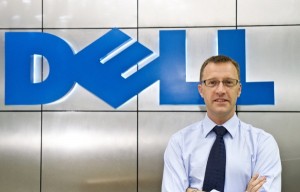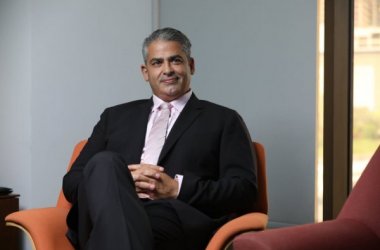Dell is extending its reach further into the channel to attract more partners. John Coulston , Director of Channel Programs and Operations at Dell Middle East, explains the partner strategy.
Can you please tell us about your distribution strategy? Is Dell committed to partners?
Historically we’ve been a direct vendor, but in the Middle East we’ve always just dealt with channel partners. Our total partner programme – Partner Direct – was launched about five years ago. It’s a globally award winning programme which is segmented into three categories: registered, preferred and premier partners, though we haven’t launched premier in this region yet. We’ve seen a real increase in preferred partners in this region recently. We’ve got around 44 here now, that number has increased by about 15-20% in the last six months.
Within these programmes we try to specifically cover individual competencies – solutions, network, security, cloud, etc. We work on four key elements revolving around simplicity, rewarding, enabling and training. What we do is allow partners to see what they need to do in order to develop their competency in these areas. We compliment their skills set with our portfolio.
Do you have partners working across your entire portfolio or are they all segmented?
We have partners who work in only separate areas. Preferred partners who work on storage are an example. We want to push capability in specific verticals through our partners.
How does a registered partner become a preferred partner?
It comes down to capability really. We will take a business plan, review it, and see if it’s appropriate for us. We need to see if the commitment from us will match the revenue we think it will bring. The opportunity is in understanding where the partner will take their business.
From your experience here in the region, what are the trends emerging in the channel?
There are a lot of different channel trends at the moment. Here, we get a lot of mega projects, but not all partners have the ability to play in those areas. We have bigger ones that do and that is a distinct advantage for Middle East partners.
The main thing is that customers are demanding more and more specialist skills mainly around virtualisation, cloud and networking. They want to know that the organisation knows how to deliver, and they want to know that the vendor is going to be standing behind them throughout to support them..
How do you make sure that your partners are equipped with these skills?
We’re doing a lot of work to bring our global IP and share that with our partners. Anything we know, they know, that’s the goal. Bringing our best practices and implementing them in the region. We take our vertical sector teams and go round and share them across our preferred partners in the region.
In actual fact, we have a specific expert in the field who goes around and actually talks and trains people on the skills which has acquired from outside the region.
What are the investments from a customer point of view, what technologies do they want?
Cloud is a big area at the moment. They want to know what it means, how to take advantage of it, etc. However, cloud questions for mid market are different to higher market questions. They want to know how to take advantage of storage, whereas at mega project level it is how to build a private cloud, and how can their employees use it. Also, security is not going to go away, that’s big now. So we focus a lot on this area.
How does Dell define value?
Value for us is around bringing a number of technology areas together to provide a solution for a partner. It could be in a physical sense, building an entire office environment or conference rooms equipped with telephony and digital white boards. Alternatively, it could be about virtualising a data centre, and introducing virtual solutions. So long as the package is complete, manageable and of high expertise, we consider it valuable.
We also want to be valuable towards the widest range of the market as possible. With the growth and maturity of online transactions and purchases, you are going to see a lot of SMB start-ups and they’ll be looking for help. So this is a big opportunity in this region.
Do you have SMB focused partners, and do their demands differ from larger enterprises?
We have generic partners focus on the mid market and smaller businesses. And then the specific partners we have will focus on the bigger corporate companies and projects.
In general the larger enterprises have resources in house to some degree and they’re responsible for specific negotiation in specific technologies. SMBs will just require more outsourced support from us, certainly more manageability.
How much of the cloud discussion is a reality in active partners?
It depends what your definition of cloud is. We have small business storage environments similar to SkyDrive, for example. That’s you first step into a cloud environment. Then you’ve got higher abilities, virtual desktop capabilities via the cloud. It could be any device accessing your data independent of where you are, that’s the cloud, and that’s realistically using it.
How do you revise strategies and keep them relevant?
We weren’t always committed to stable strategies and people didn’t like this, so now we’ve changed that. We’re far more focused on being strategically stable. Our partner programme will stay the same, as will the key elements of the strategy. Our partners can now rely on that.
How are incentives changing?
The maturity of the channel has increased here in the Middle East over the past few years. The question now is: how can I build my infrastructure so that I have the most competitive offer for my customers out there, how do I build my capabilities and how do vendors support us during that?
We also need to look at how we work together to make sure the technology is up to scratch.
The technology is becoming more sophisticated, fortunately Dell has a huge depth of knowledge, and our partners love that from us. We’re built to work directly with customers and partners can take advantage of that if they plug into it.
Dell is actively expanding, what will the big announcements be in the coming months?
Our major announcement is our re-launch of the preferred partner programme, though it’s not really a re-launch as we never launched it properly in the first place. That’s our focus for next couple years. You’ll see us launch a cloud competency programme in very near future too. We already have storage and we’ve close the acquisition of SonicWall, so security programme will come out soon.
We have WADI (workshop/assess/design/implement and manage) approach, and we will push that over the coming years and sharing with our partners.
What will be your main focus for your partners?
We will focus heavily on what they need in order to demonstrate ROI and what they need going forward. Building a long term relationship with new partners is a key focus, making sure the data centre is always up and running etc. That project management type of approach is a critical element that partners are interesting in and I see that being a big trend in the coming months.
What are the main challenges facing the channel and how does Dell help address these?
The key challenges are the pace of technology change, the cost of keeping up to speed with change is dramatic. The requirements partners need to increase investments grows all the time.
If we can keep our programmes to our 4 pillar strategy then we’re on the right track. Partners have specifically said ‘help us get specialised’, ‘don’t ask us for one thing today and a different thing tomorrow’, and ‘if we invest with Dell, will we see a return on that?’ These are the main areas we need to focus on in order to serve our customers’ challenges.
Our commitment to our partner programme is just getting bigger and bigger over time. Investing in our partner programme is so important to us here at Dell.
A main partner fear is the commitment to technologies during times of change. We’re in it for the long term, we won’t change our strategy and we won’t lower our support. We’re staying put and we’re committed to standing side by side with those partners.





